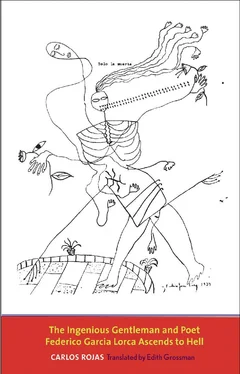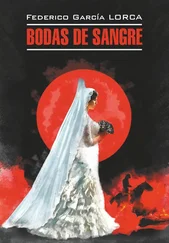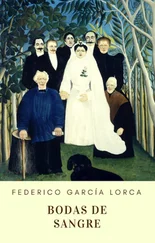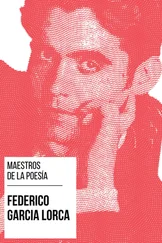If there were an invisible book of his life that would precede it point by point before it was lived, it would also have a footnote about other loves, this time incidental. Ignacio had an affair with a foreign woman, married and with children, whose name I forgot even though I introduced them myself. La Argentinita, who was never jealous of Ignacio’s wife, was carried away now by resentment, suspicions, and rancor. She called or came to see me almost every day to tell me, in almost identical words, her desperation. I ran from Madrid to Granada, to my parents’ house, to avoid her. Or rather, I imposed a truce and escaped the city for the same reasons I didn’t want to go to Ignacio in his agony: because I could never bear my own impotence in the face of other people’s sorrow. When I returned, on a very quiet Sunday morning, I was with some friends in a café on the Gran Vía when Ignacio happened to come in. He stopped at our table, spreading his legs wide and planting his feet firmly on the floor, his overcoat open and his arms crossed behind his back beneath his Herculean shoulders, his hat pushed back on his bald head of quartz and feldspar, and no one asked him to sit down. He looked contemptuously at my companions, young Gypsies and unripe flamenco singers, very affected and not rich in talent.
“When did you get back from Granada?” he asked me.
“About ten days ago,” I lied, because it was only five.
“Why are you so hard to see? You promised to let me know when you got back.”
“Well, I didn’t.”
“What reason do you have for avoiding me?”
“You know better than anyone.” I lowered my voice without taking away its coldness or severity. “You acted like a thug with someone I’ve always loved. This foreigner has her husband and you had La Argentinita.”
“That’s no reason for you to avoid me as if I were a leper. Can we talk in private?”
“I have nothing to say to you, Ignacio, and it would be better if we didn’t see each other again.”
He had been recognized in the café and people were looking at us. He knew he was being observed by the curiosity and evil-minded gossip of strangers, as if he were a circus clown, but he couldn’t move. Incapable of leaving or of taking a seat when one wasn’t offered, the man who kneeled in front of bulls and slapped them to incite them to attack was rooted to the floor and submitted to that contempt in the presence of strangers and my Gypsy adolescents. I looked straight into his eyes. He lowered his, and his shoulders seemed to collapse beneath the coat tailored in London. My attendants, the flamenco boys, began to smile and exchange poisonous whispers.
“Where are you going now?” he asked in a thin voice, biting his lips.
“I was going to have lunch.”
“With your friends?”
“With them, in the usual restaurant.”
“I’ll go with you,” he murmured.
“Nobody invited you.”
Ignacio slowly began to stoop as if he were looking for a crack in the floor to hide his vanquished eyes. He knew how much I had always admired him and respected his valor in the ring and his talent in the theater. He met the bulls from the base of the barrier, as they left the bullpen, and wrote mad short pieces for the stage. For some time and without ever asking him about it, I had been convinced that his surrealist works and his bullfighting were part of a single magnificent, almost suicidal effort to give meaning to his life and make himself known to the universe. In a kind of symmetrical irony, when I saw him subjugated in that way, I detested my unexpected strength and absurd cruelty. And yet I couldn’t renounce either one, once they had been revealed, without ceasing to be myself.
“The restaurant is a public place,” he finally muttered. “I can go there to have coffee, if I want to.”
I refrained from answering and he left, dragging his feet, not looking at me. He left the way he came, though now his shoulders were bent, his hands still clasped behind his back beneath his open overcoat. I had almost forgotten about La Argentinita and my indignation at her suffering, but I thought about the many women Ignacio had loved. He wasn’t drawn to them by lust, pride, or even love, though he thought he was in love with all of them at the same time. The bed, the bullring, and the theater were stage sets or benchmarks where he tried to augment and play the part of the authentic Ignacio Sánchez Mejías. An Ignacio Sánchez Mejías who constantly overflowed the person the universe condemned him to be. I would think about Ignacio and the synthesis of his biographical sketch that I was doing then, when on the eve of the war and my own death, Don José Ortega y Gasset came to talk to me during an intermission at the Club Anfistora. “The man is always more than the man,” he said about I don’t know who, his long ivory cigarette holder that looked as if it belonged to Marlene Dietrich, the Pall Mall lit at the end, held between those teeth of his that were so incredibly young for his age. “No,” I replied. “But some men make the effort. Ignacio Sánchez Mejías was one, and soon it will be two years since his deadly goring in the Manzanares arena.”
As soon as I sat down in the restaurant with my two apprentice flamenco singers, Ignacio came in alone. He went to a corner table and sat with his back to the wall. He stayed there for eternities, bending over a glass of sherry or manzanilla as if waiting for the wall to split and fall on his back. From time to time he glanced at me surreptitiously and then became lost in thought again, contemplating the tablecloth. They hadn’t finished their garlic soup when I rudely dismissed the Gypsies. They left without embarrassment or surprise because my lavishness made them servile. They were my version of the dark vice as opposed to the love that could not say its name, which in those days I didn’t feel for anyone. I had met them in my only period of plenty and squandered the rights to my theater pieces on them so they would kiss me on the sly. Afterward I hated myself for hating them.
When I was alone, I looked at Ignacio openly. You could almost see his skull beneath the skin, just as Freud’s cranium was visible in the charcoal sketch Dalí made of him. (“A perfect example of the Spanish fanatic,” Freud very accurately said of Dalí.) Sánchez Mejías’s was broad across the forehead, the cheekbones, and the temples. Obstinacy had hardened his jaws and pressed his lips against his teeth. Inadvertently I must have guessed then that the two of us, Ignacio and I, would die soon with all our blood spilled on the ground. Almost ten years earlier and in an indirect way, I made one of my characters in the “Sleepwalking Ballad” foretell my destiny. He asks the father of his dead lover to let him die in his bed, the metal one with linen sheets, when he arrives with stab wounds, pursued by the Civil Guard. The transaction cannot be concluded in the poem, just as I failed to be aware of my inevitable fate. Yet the poet’s senses and instinct must have perceived whatever reason and conscience did not elucidate, because I suddenly surprised myself by beckoning to Ignacio with my hand. He looked at me without seeing me, as if he could not credit my intentions or my very existence. Finally he stood up, urged on by my impatience, and staggered to the table. You might say he wasn’t certain whether this was happening to him or to someone who was his living facsimile in soul and appearance. Once again, as in the café, everyone was looking at us. They had recognized Ignacio, when he hadn’t managed to identify himself, but at that point I didn’t care about the attention of strangers. Life was truly becoming a lie, and knowing you were being observed was as appropriate to the circumstances as the audience in a theater might have been. I embraced his shoulders and offered him the menu, looking into his eyes. They were very dark and wide open, with silver threads flashing near the iris.
Читать дальше












